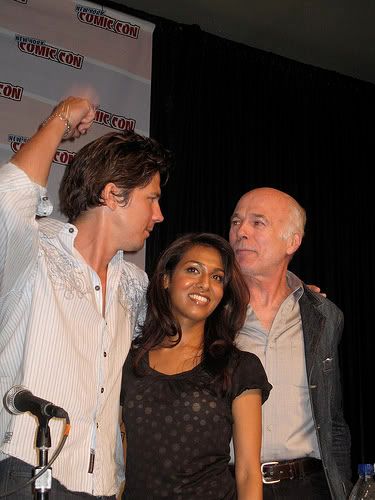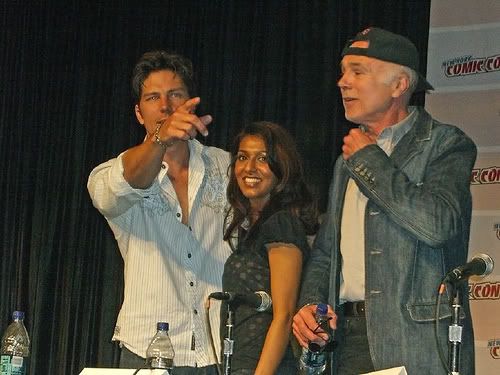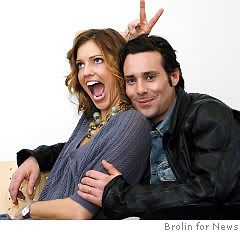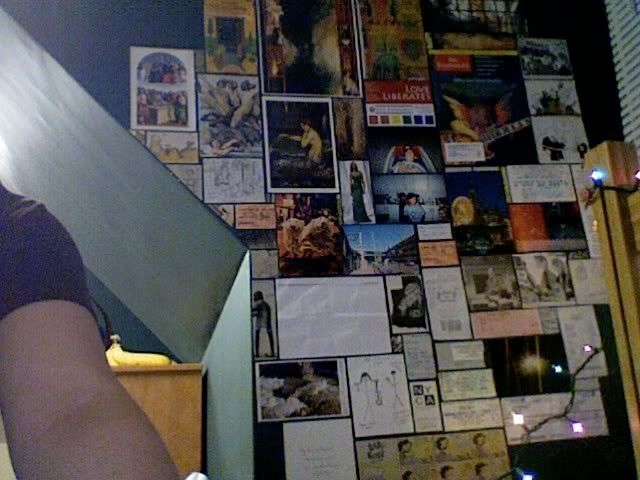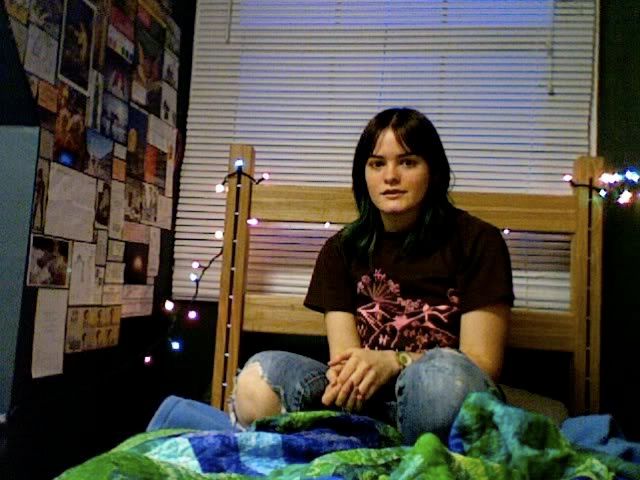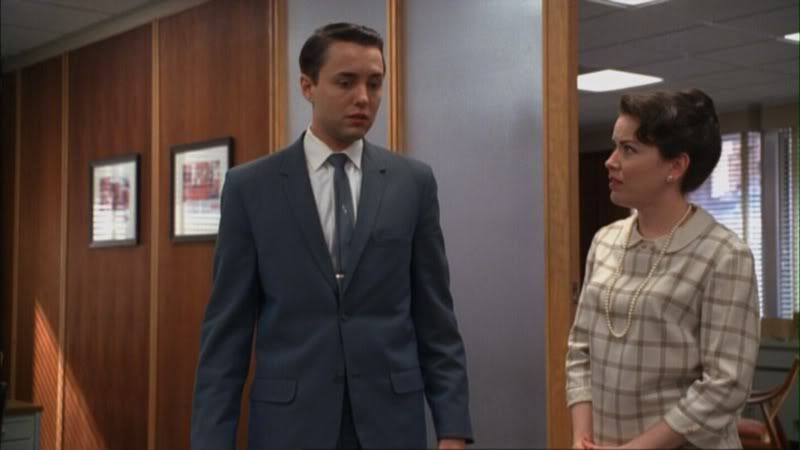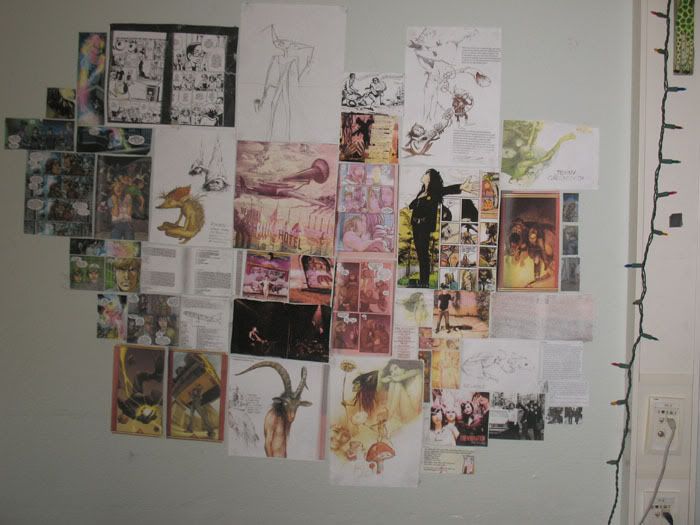I don't know anyone who is blind, but I have a strange relationship to blindness because it's in my genes, and I decided a few years ago that it would be immoral for me to have biological kids because I don't believe in genetic engineering or selective abortion but I don't want to create a kid who I know will have a rough time. I mean, kids can have a rough time for a lot of reasons, and I don't really think it's moral to create a kid if you can't naturally have one with your partner*, so I think I would have come to the same conclusion anyway. But I started thinking about it because of my genes.
Also, I used to always wish I was a boy, so it would be okay for me to like girls and be overinterested in things, but if I was XY I actually wouldn't exist. Whenever my mom thinks I am being too "flip" about disabilities, she reminds me that her brother, who has the syndrome we carry, told her to abort me if I was XY. I don't know the syndrome, or my uncle, very well. I just know it gets worse as you get older. It's called Ocular Albinism Nettleship Falls and when I try to look it up on Wikipedia there's just a scientific explanation and it doesn't really help me understand what happens to a person who has it. But I guess that you have pretty bad vision when you're a kid, and it gets worse until, by the time you're in your twenties, you're legally blind.
The thing is, I feel like my uncle telling my mom to abort me is not really proof of anything innate about blindness. When I was younger I used to think that I was depressed because homosexuality is toxic and I used to think that my parents should have taken me to aversion therapy or something when I was still unformed enough that it could have changed something. I think my uncle has had a hard time because things were harder for pwds when he was a kid, and also for other reasons that aren't actually related to his disability, but it's easier to imagine that they are.
The reason my mom told me I was being flip is probably that I was being flip. I used to be on this skin medication that's really intense, and if you get pregnant while you're on it, there's a high likelihood of birth defects (according to Wikipedia, the usual ones are "hearing and visual impairment, missing earlobes, facial dysmorphism, and mental retardation"). There's this government program where everyone who goes on the medication has to go on two forms of birth control, one of which has to be the Pill. I've actually been on the Pill quite a lot considering I'm a homo--I was on it for a year or two for my skin when I was 14-15, and then I was on it for several months when I was eighteen because I was on this skin medication. I really don't like taking it, for aesthetic reasons--I just think having a fake period is weird--and besides, it leads to me crying a lot the day before my fake period starts, which I don't enjoy.
This is frustrating because my skin got super horrible while I was in the UK and it hasn't improved much since, but I really don't want to go on the medication again because I don't want to go on the Pill. It makes me sort of mad that I'm not allowed to just say I'm gay. I feel like being gay is considered to be some personal thing that I'm supposed to keep to myself in medical settings because I have to follow all the straight person rules anyway, because every XX person must be having sex with XY people.
Anyway, I was complaining to my mom about this, and I said, "isn't it kind of weird that the government is allowed to legislate against the conception of disabled babies?" and my mom said it's so people can't sue the government if they have a disabled baby, and I said, "well, can't I just sign a form saying I don't care if my baby is disabled?**" and then my mom told me that I was "flip" and "spoiled" for saying I didn't care. She was saying how hard it is if someone's poor and they have three kids and one of the kids is disabled, and I said we need better government services, and my mom says the government doesn't have unlimited resources, which is true although I do think that if stuff was better organized then we would have better services than we do now. My mom also said that I have a biased view because if I read disability blogs, then I only see the perspectives of people who are okay with being disabled.
I guess it is true that I'm flip as all get-out, but at the same time that's kind of a preemptive strike. I think I'm trying to make up for people who aren't flip enough, if that makes sense. I mean, I think our culture has this huge, heavy idea of what it's like to be related to a person with a disability, and that results in discrimination and abuse because people think that it's this difficult experience they can't possibly understand, so if someone kills their kid, or abuses their kid, or publicly talks about their kid in an abusive or threatening way, you're not supposed to react to it as if it's a cut-and-dry situation. It's supposed to be "flip" for me to say that Alison Singer (to use the classic example) did something fucked up, because I'm supposed to be intimidated by Oh My Gosh She Has An Autistic Child. I'm supposed to apply myself, to put a lot of effort into understanding the complexity of her situation. But the truth is, in my opinion, it is
not complex, and it's offensive to say that it's complex.
The reason I'm talking about family members and not actual pwds is because I think our culture doesn't think much about pwds ourselves and just thinks about the people who have to take care of us. I really liked Getting the Truth Out, which was a website that deconstructed the portrayal of nonverbal people, and was basically a nonverbal ASD person writing, "hey, I'm actually a person, and way I look and the kinds of help I need are just my life, but they can be written about in really shaming language;" please, as I would say, be human, and relate to people as other humans instead of freaking out about how they seem different. Anyway, I linked it on my blog one time, and my mom said, "well, think about it--someone has to take care of that person." Which is like--so what? The person who made Getting the Truth Out was Amanda Baggs, who I believe is supported by people who do support staff work for a living, so--what's the problem, we're supposed to be upset that people have jobs? How does that make Baggs's assertion that she's a person any more complex?
So, yeah. I think that I have a tendency to act like disability isn't a difficult thing because there's a tendency in the larger culture to inflate the difficulty of disability to ridiculous levels so that people can go around doing offensive and evil things to disabled people. So I'm reacting against that, and probably being a brat, but I just get so frustrated.
Sorry this is incoherent, maybe I'll rewrite it later, especially because it's about two subjects, just some disclaimers:
*I feel weird making statements about what's moral but yeah, I think that if you need to use science in order to give birth to a kid, you should just adopt one, because a lot of people already exist who need parents. This isn't because I think that non-XX/XY couples, or XX/XY couples who are infertile, are particularly unfit to have kids. Adoption
is having kids. It's wasteful to make more, but it's especially wasteful if it requires extra effort and money to do so. I'm not trying to legislate this but I feel like people let their distaste for adoption (which is really fucked up) keep them from making the logical and ethical choice.
**I'm never going to get pregnant anyway so it's not like I was seriously saying that I "don't care" about having a kid with birth defects. I personally wouldn't get pregnant in a situation where I knew that was likely; I'm just saying it's weird that people aren't given the choice to say they don't care, because they should be allowed to not care if they want.
***This is not actually a disclaimer, just something that I think is funny: some of the things disabled people's parents say are the same things liberal people say when their kids are gay. Straight people don't like having gay kids, and if they're openly homophobic, they just say this straight out, but if they're not, they tend to express their unhappiness by stating a ton of facts, such as, "gay people can't get married and have non-adopted babies," and, "if you are gay people might attack you," and, "it is harder to find a relationship if you're gay." The upshot of all these facts being, it is difficult to be gay. Thanks for the information, you guys! I had no idea!
From the limited sample of me, I think that when straight liberal parents constantly repeat facts about how hard it is to be gay, that makes it harder for their kid to be gay. And I think that some of the same stuff is true when it comes to disabilities. Stuff
is hard, but emphasizing how hard it is can be a cover for prejudice.
